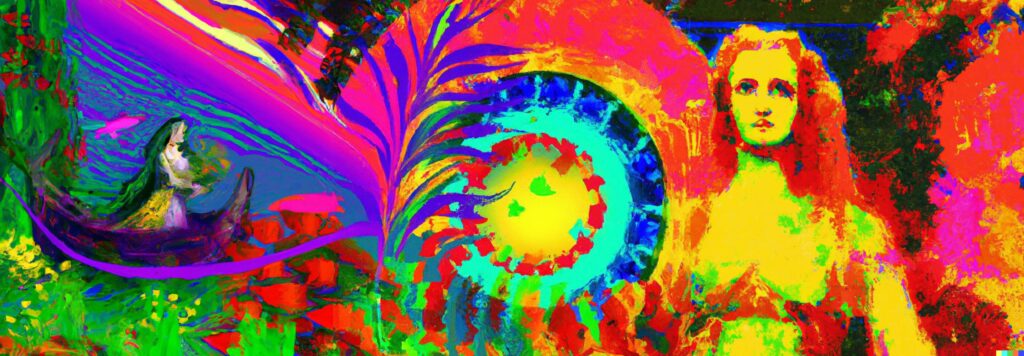
Beginning birthed out of Chaos, the impulse to Life, Animation; this concept of genesis, gave centre stage in the early Greek Mythologies to a very great and old Goddess, a distant echo of primordial longing. Eurynome is the Pelasgian Mother of All Things, most ancient of original imagos; she embodied all that was born out of Chaos, she was godmother to her own destiny.
The Pelasgians had settled in the hills of Northern Greece in the Bronze Age and just as Orphic, Homeric and Olympian stories all foretold the retirement / death of their Great and Grand Matriarch, so too did the Pelasgians imagine their story through the mythic life of their Mother, the Goddess of All Things. Eurynome, one name for the many faces of the Great Mother of ancient Greece is a mythopoetic sister to all of her manifestations; particularly those we have become familiar with through classical literature. As Gaia, Themis, Nox, Thetis, Metis, Demeter, Tethys, Aphrodite or even the young and newly consecreated Psyche; the Great Mother, as Eurynome, signifies the beginnings of Life as we know it. And like all beginnings She is often left behind as time marches roughshod over memory. As Her importance fades the birth of creation becomes a footnote in history and Her story loses its original awe, and yet Her story was the story of awe itself.
Riding on the waves of her delight, Eurynome rose joyously from the foundations of her Being, her very ecstasy giving birth to Sea and Sky. Naked out of Chaos the very rhythm of her Being swept her forth, leaving magic, mystery and a terror in its wake. Lured toward the south, she seized the tail of this beckoning north wind, chasing herself ever further into existence. The serpent Ophion, child of this original cosmic dance the genesis of Her desire, became the symbol of Her creation. Inspired by such lust, Eurynome and Ophion continued their all- consuming dance, giving birth on the waters to Life in the form of the Universal Egg. With Ophion coiled protectively seven times around the Egg, Life continued to renerate, until the Egg split in two, spilling forth all that is.
From their lofty home on Mt. Olympus, these archetypal parents gazed protectively over their brood including the Seven Planetary powers each with its twin lineage. Not content with consortship, Ophion began to claim authority, seeking recognition for producing the Universal Egg; and such claims aroused the wrath of Eurynome. Her authority questioned, Eurynome retaliated; banishing Ophion to the furthest reaches of her vast empire.
And the fates conspired yet further as Life flourished, and the discordant couple soon were overruled by their offspring; the proxy dethroning enacted by Cronus, his mother’s agent of destruction. Eurynome sank despondently into the sea , her despair unnoticed as the children of Cronus sought to re-enact the parental death / rebirth by which they too would seize authority and all of the power it conveyed. As Cronus has been empowered by the destiny of Ophion, so too was Zeus, Son of Cronus, wafted to Heaven on the wings of his father’s defeat.
Although Eurynome no longer danced She lived quietly in the waves of her Birth, rocking gently back and forth, giving shelter to the rejected Haphaestus; giving birth to the Charities (the Graces) by the young Zeus. Gently rocking, she remains there yet; The Mother of All Things, Goddess of the eternal dance.
To achieve both an informative yet lyrical style, giviing substance to an ancient fragment of a story, I used the following books to guide me
Works Cited
- Bonneyfoy, Yves. Greek and Egyptian Mythologies. University of Chicago Press. 1992.
- Bulfinch, Thomas. Bulfinch’s Mythology. Bantam Doubleday. 1995.
- Flaum, Eric. The Encylcopedia of Mythology. Gods, Heros and Legends of the Greeks and
- Romans. Running Presss / Friedman Group. 1993.
- New Larousse Encylopedia of Myth. Prometheus Press (Hamlyn). 1972.
Jobes, Gertrude. Dictionary of Mythology Folklore and Symbols. Scarecrow Press. 1961.